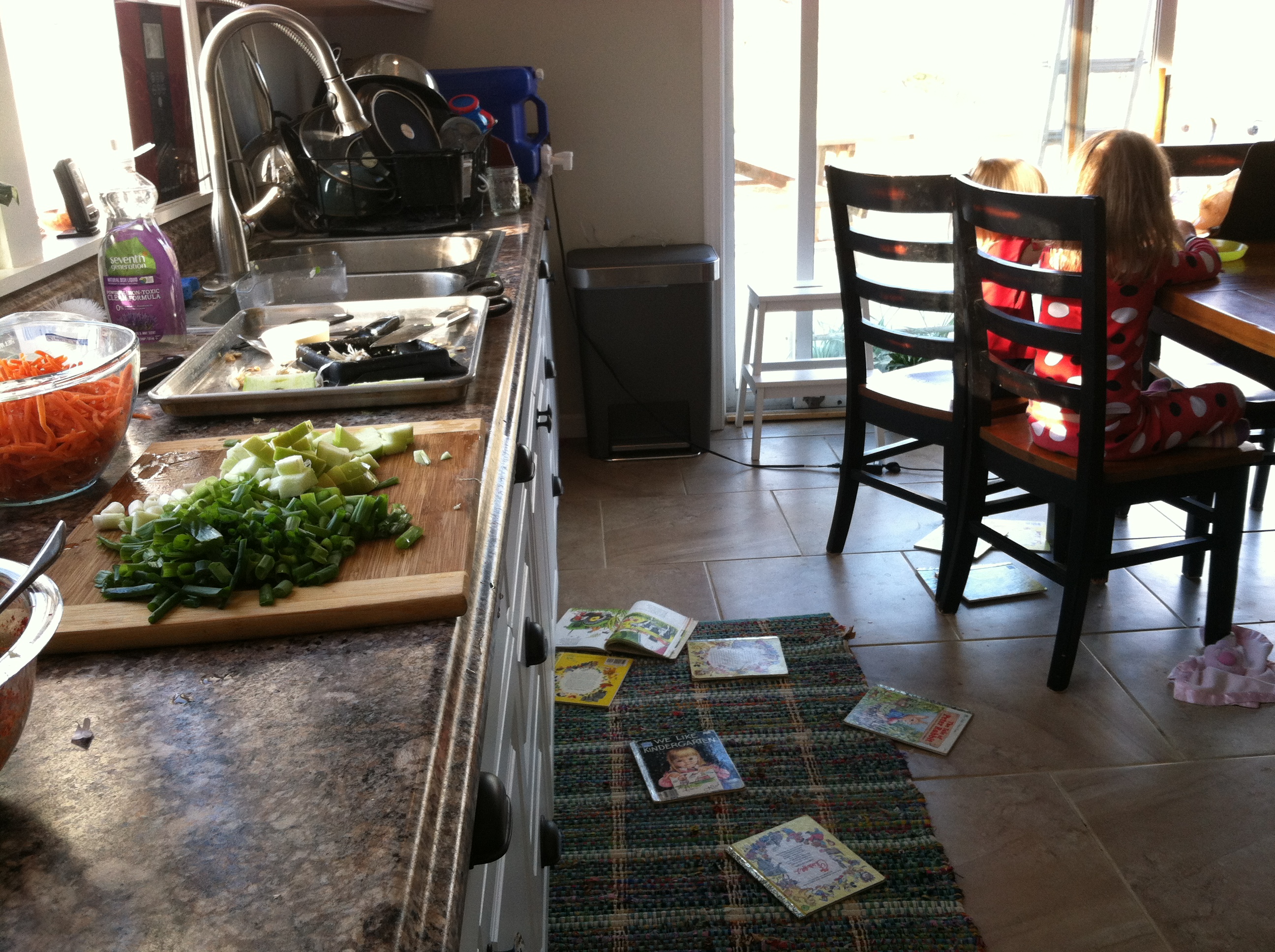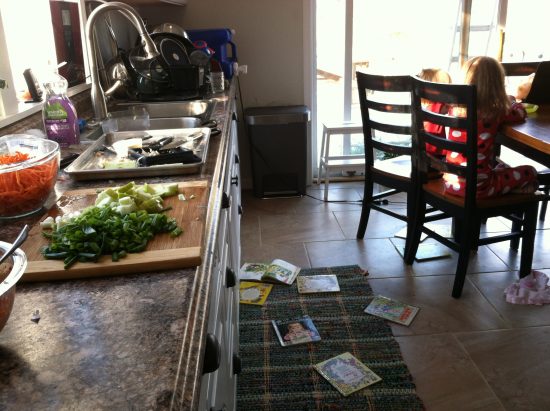
The Snail Shell of the Soul
 I heard a thunk and returned to the kitchen. My two eldest daughters stood at the patio door and stared down at a female cardinal outside on its back. Its large, orange beak opened and closed as snow flurries clung to its tan and red wings.
I heard a thunk and returned to the kitchen. My two eldest daughters stood at the patio door and stared down at a female cardinal outside on its back. Its large, orange beak opened and closed as snow flurries clung to its tan and red wings.
I quickly put the baby on the carpet in the living room, grabbed my rubber gloves from beneath the sink, and slid open the door. But it was blistering cold, so I put on a hat and coat and then went out. The cardinal, when I picked it up, made a sound like one of my daughters’ squeaker toys. But it was already dead.
Aware two pairs of eyes were watching me, I walked across the yard toward the woods and ceremoniously laid the cardinal on top of a log.
Out of sight, out of mind, I thought.
It didn’t work. My children were suddenly fixated by death. When my husband came home, my three-year-old told him, “The bird broke its neck.” She spread her hands and said soberly, “It’s not gonna come alive no more days.”
Two nights later, my five-year-old asked, “Am I gonna die?”
We were in the middle of bath time, and I’d just had to admonish her for not talking like a lady, and then—the next second—she was delving into existentialism.
I looked into her deep brown eyes, already half-filled with tears. I honestly didn’t know how to address this. “Yes,” I said. “When you’re old and you’ve lived a really long time.”
Her face collapsed. She slid down into the sudsy water until only her lips and nose peeked out. I leaned across the bathtub and pulled her up, brown hair streaming, and held her against me. The sleeves of my sweater were soaking wet.
“I’m scared of dying,” she said. “I don’t want to be separated from you.”
Her three-year-old sister widened her blue eyes and patted her chest. “I’m gonna be bave when I die.”
I didn’t know whether to sob or laugh.
On Tuesday, my husband and I traveled to Alabama to meet with a naturopathic doctor. Now, the counter between the toaster and sink is bordered by supplements, and we’re juicing about anything that’s been plucked from a tree or pulled from the ground. We received immeasurable hope through that visit, and yet—holding my five-year-old’s warm, trembling body—I was keenly aware that we could only talk about “becoming healthy” or “going for a check-up” a few times before my very perceptive child understood that something’s wrong, and we’re trying to fix it.
I prayed for wisdom. I prayed for a way to explain. I bracketed her little chest between my hands and said, “You know how you like snail shells?” She nodded, for she keeps a chest at the foot of her bed filled with the “treasures” she finds in the woods and creek. “Our bodies are like those snail shells. The outside might get old and cracked, but the inside—the soul—will live forever.”
She turned her head and met my eyes. She looked skeptical. I didn’t blame her.
“We will always be a family,” I continued. “Our souls will always be together, no matter what.”
Oh, how my heart ached as I realized that I’d failed them. I’d made a point to explain about birth and how natural it is, since I have three daughters who will—more than likely—produce my grandchildren. But I had made no effort to dispel fear regarding the inevitable counterpoint to birth: death.
Why does our society fear it so? Why did it hurt me to fumbling explain?
After the girls were tucked in bed, my husband and I were in the kitchen. I sat at the table; he leaned against the stove. He said in a high-pitched voice, “Your shell might get old and cracked, but your snail will always remain.”
I laughed and laughed even while wiping tears from my eyes. “What was I supposed to say? It was awful!”
He smiled gently. “You did a good job.”
But, obviously, it wasn’t good enough.
A few nights later, my eldest calmly said, “Daddy’s gonna die first.”
Her prediction stopped me cold. I looked at her and said, “We speak life in this house. Life. Your daddy’s strong and healthy and is going to live for a very, very long time.”
She nodded, and though I’d reprimanded her, I could tell that she’d needed—and had even asked for–that stern reassurance. Sometimes, I need a stern reassurance, too.
Last weekend, my husband took our two daughters to the grocery store while I stayed home with the napping baby. On the way home, my eldest said that she wanted to ride in a hot air balloon for her sixth birthday.
My husband asked, “You wouldn’t be scared?”
“But you would be there, wouldn’t you?”
“Yes, I’d be there.”
She smiled and settled back in her seat. “Then I wouldn’t be scared.”
I think of that conversation now as I ponder how to teach my daughters about the natural process of death and the eternal journey of the soul. I do not know everything there is to know about either, and sometimes, this lack of knowledge leaves me trembling like my five-year-old in the bathtub. And yet, I also know that my Father God will be with me—with us—every step of our journey, and therefore I won’t be scared.
To sum it up in my three-year-old’s words, I will be “bave.”
Have you ever had to talk to your children about death? If so, how did you approach it?
Sorry, the comment form is closed at this time.



Rebekah Love Dorris
If you ever get no comments, know that it’s not because people aren’t reading. We’re blown away and don’t know what to say. It’s embarrassing to say anything in the face of such profundity. The only reason I’m commenting is because God tells us to communicate when we’ve been taught truth. But I’m speechless. Amen.
jolina
Thanks, friend. I so appreciate you and your compassionate heart.
Nann
… As they so often do, your thoughts and words have taken my breath away. Thank you for sharing yourself for the benefit of all of us who come here to read, breathe and grow. You are a jewel, Jolina, and this blog a treasure!
jolina
Thank you, Nann. Meeting you here has been a treasure as well. I so appreciate your constant support and encouragement.
Judy
Oh that’s perfect. Beautiful. I may use it myself some time. Thank you for sharing your snail wisdom and reminding me that sometimes our kids crave that same strong reassurance we do.
jolina
Most welcome, Juju. Always a joy to see you here, fellow mama. 🙂
Rachel
There’s no formula for talking about death. You did good, Mama.
I’ve had a similar conversation recently about my mother’s death with my children. They were teenagers and young adults when she passed. They’d grown up watching me, helping me, care for her. I made the blind assumption they understood, when hospice was called in and dialysis was no longer an option, death was near.
Mom had been to the brink and back so many times, this was simply going to be another one of those experiences.
We don’t always have the option to talk through each phase. Even if we have that privilege, we are never fully prepared for the departing.
jolina
You are a beautiful and compassionate daughter and mother, Rachel. You did good, too, Mama.